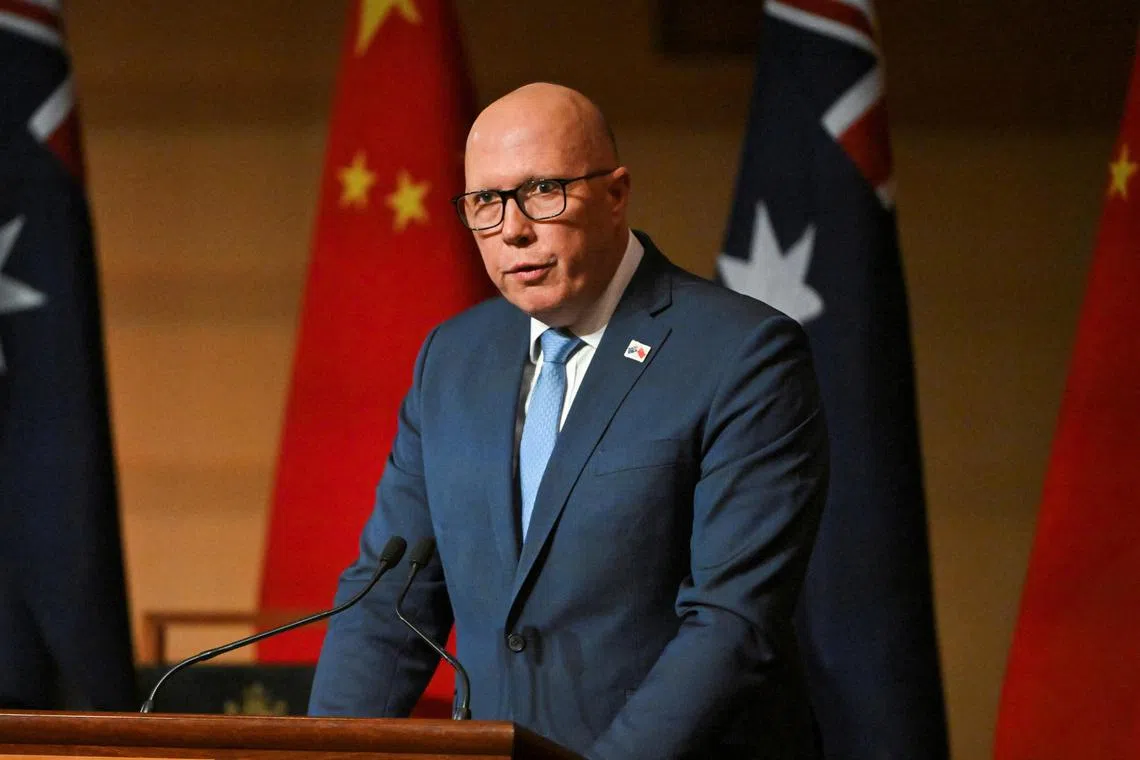Australian opposition details plan for 7 nuclear power plants if elected
Sign up now: Get insights on Asia's fast-moving developments

Mr Peter Dutton speaking at a luncheon for China’s Premier Li Qiang at Parliament House in Canberra on June 17.
PHOTO: REUTERS
SYDNEY – Australia’s conservative opposition will build nuclear power plants across the country if it wins the next election, according to plans unveiled on June 19 that have reignited debate over climate policy.
Opposition leader Peter Dutton said he would overturn a 26-year nuclear ban to build seven government-owned reactors on the sites of ageing coal-fired power stations.
Calling an election due within the next 11 months a “referendum on nuclear”, Mr Dutton said current policies to scale up renewables were ineffective and unreliable.
Australia’s science agency has warned that costly nuclear reactors would take at least 15 years to build, while critics have derided Mr Dutton’s plan as “toxic”, “risky” and “economic insanity”.
The shift to nuclear power would be a sharp departure from the energy policy of Prime Minister Anthony Albanese’s government, which aims to ramp up renewables and gradually wind back heavily polluting coal-fired power.
Under the opposition’s plan, the first government-owned reactors would come online by 2035 at the earliest, Mr Dutton said.
Eventually, five of Australia’s eight states and territories would host a nuclear power plant.
Polling released by the Lowy Institute think-tank earlier in June showed Australia’s long-time scepticism about nuclear power had “shifted markedly”, with six in 10 Australians supportive of some form of nuclear energy.
Over the past decade, an ideological brawl dubbed the “climate wars” has dominated Australian politics, repeatedly undermining attempts to reduce carbon emissions.
“We cannot afford to squander more time in moving our economy away from its reliance on climate-damaging coal and gas,” said Australian Conservation Foundation boss Kelly O’Shanassy.
Climate finance expert Tim Buckley said nuclear power in Australia was “impossible”.
“The idea that nuclear could be up and running in 2035 to 2037 is fanciful, and even that is too late given our concurrent climate and energy crises,” he said.
Nuclear power generation has been banned in Australia since 1998.
Australia’s renewable energy ambitions have grown in the past decade, especially in wind, solar and battery storage.
Nearly 40 per cent of the nation’s total electricity generation comes from renewable energy, according to the Clean Energy Council, a non-profit industry body. AFP


